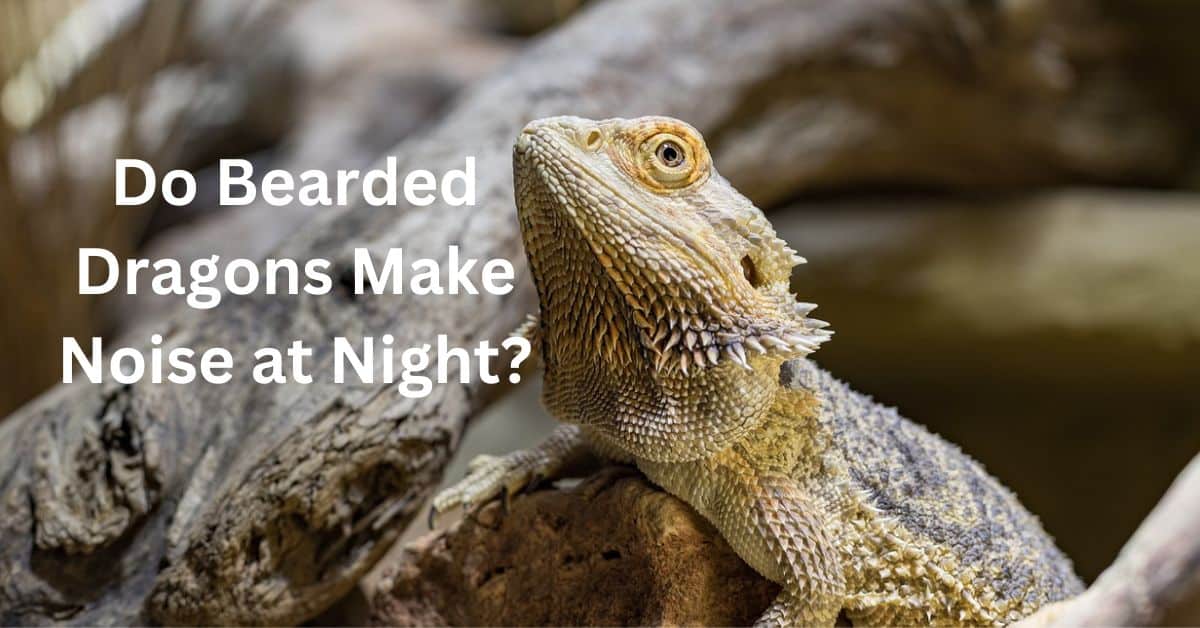As an affiliate, we earn from qualifying purchases on Amazon. We get commissions for purchases made through links in this post.
Bearded dragons are the jungle’s “Kings of Chill” and love spending their time in the sun, basking their days away. And while they’re conventionally known for their timid and reserved temperament, do bearded dragons make noise at night?
We’re all familiar with the sounds that animals make. And frankly, it’s typical to assume that every animal in the world makes a noise of some type.
Beaded dragons aren’t an exception, either. But, does the sound they make keep you turning and tossing in your bed at night, distracting you in your sleep? This article helps you find out.
Do Bearded Dragons Make Noise at Night?
Bearded dragons don’t make noise at night but spend hours sleeping quietly under rocks, whether in the tank or in the wild. They’re diurnal and don’t stay up at night like other reptiles and noisy lizards.
Moreover, while they can produce a sound, it’s usually nothing more than a fainted hiss that hardly feels disturbing.
If you’re keeping one for the company as a pet, it’s okay to be concerned about how much noise these reptiles can make. However, rest assured that they won’t disturb you in your sleep, even at the peak of their energy when mating or in their little duels. Moreover, these reptiles enjoy their sleep better than anything and will hardly keep you turning and tossing in your bed.
These reptiles usually communicate using distinct body language and accompany these actions with a bit of hissing. Unlike other reptiles, they don’t necessarily give out a sound unless they’re stressed, or their environment feels intimidating.
A beaded dragon will only produce this hissing sound when fending off an enemy in its territory or trying to convince a female to mate.
In such cases, they usually accompany the hissing by bobbing their heads and inflating their throats to unleash their alpha male and naughtier sides. However, it’s hardly surprising hearing them hissing in the night. And if that occurs, the following could be the reason.
Also Read: Do Bearded Dragons Need Light at Night (SOLVED)
Reasons Your Beardie Could be Hissing At Night
An Illness
Bearded dragons are unusually hardy and hardly compromise on illnesses. However, they aren’t indomitable since a few diseases, infections, and parasites can drive them to the edge.
Vulnerability to Attacks
Bearded dragons won’t just hiss at humans approaching but other animals that predate on them. They’re pacey and will almost immediately vanish when they feel threatened.
Shedding
Like other reptiles, bearded dragons shed their skin, and that’s quite unsettling. They can be noisy and poky into the night, especially if it’s their first time. If you’re keeping one for a pet, this sound shouldn’t be so disturbing; maybe just concerning.
You May Also Like: Why Do Bearded Dragons Have Nose Plugs + 5 SIMPLE Removal Steps
Do Bearded Dragons Make Noise?
Bearded dragons hardly make noise out of habit, except for situations that push them to the corner. These reptiles are usually timid and love keeping things to themselves unless perhaps they feel disturbed.
Moreover, they don’t have vocal cords to produce a sound but rather a sharp hissing sound that can only feel disturbing at a closer range.
As you know, these reptiles aren’t aggressive but rather timid and reserved. But what can compel them to get messy and noisy? That mainly depends on their surroundings and what it throws at them. Fights break between these reptiles, and the quest for dominance is always a pride for the males.
That makes them disoriented and vigorous, excited enough for a duel. However, that’s more apparent in the wild than for bearded pet dragons, where it’s unlikely they’ll lock horns with other males in their territory.
Also Read: What Are Femoral Pores Bearded Dragon (Know The TRUTH!)
What Noise do Bearded Dragons Make?
Beared dragons usually hiss since they don’t have specialized vocal cords to produce a sound. But what noise do bearded dragons make apart from their typical hissing? Whistling, rasping, or coughing are typical.
Whistling isn’t standard for bearded dragons, but it’s possible to get that sound if you’re keen enough. Mainly, this sound comes from breathing, and something lodged in their nostrils may be causing it. If so, removing anything clogging the openings should eliminate the sound.
Also, please don’t be surprised if your bearded dragon coughs. Possibly, dust, cold, and high humidity can be the precursor. It may not indicate an infection, but please remain vigilant to diagnose any illnesses.
You May Also Like: Do bearded dragons burp? (Surprising Truth)
Why Is my Bearded Dragon Making Noises?
It’s typical to wonder, “why is my bearded dragon making noises? Your bearded dragon might be noisy out of coercion from unsettling stimuli. A cold environment can make your pet ill and unsettle it, making it noisy. Besides, they do that when upset by the noise around a home.
Constant rumbling, dog barking, TV, a crying baby, or traffic outside can unsettle your pet. Also, introducing another pet at home unsettles your bearded dragon and might make it noisy on end. However, that should stop once they’re used to their new friends, who eventually become more familiar.
Still, hunger and thirst make them noisy, and they’ll surely make their feelings known. Therefore, always provide a snack, food, and water to keep them full.
Also Read: Do Bearded Dragons Squirt Blood Out of Their Eyes
Conclusion
Do bearded dragons make noise at night? Not quite. Bearded dragons are peaceful and will never disturb with nagging noises at night. These reptiles can’t vocalize since they don’t have the mechanism for doing so. However, they’ll make their presence known through hissing if the environment isn’t accommodating.
Nevertheless, it’s possible that your pet reptile coughs or whistles, which shouldn’t be overly concerning. But please keep a close eye on them if it persists.

